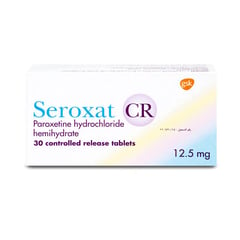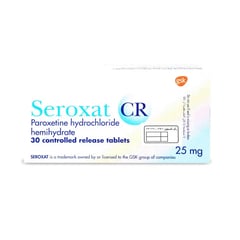Need Physician?Approval
Seroxat 20 mg Tablets – 30 Tablets

In stock
SKU :
1011-SM015
A valid medical prescription is required to dispense this medication .
It is used for the treatment of adult patients with depression and/or anxiety disorders.
Paroxetine hydrochloride 20 mg Tablet
What is Paroxetine hydrochloride and what is used for :
Paroxetine hydrochloride is a medication that belongs to a class of medicines known as “selective serotonin reuptake inhibitors”.
It works by increasing serotonin levels in the brain; a hormone which is naturally present in the brain and may be linked to depression and anxiety when deficient.
It is used for the treatment of adult patients with depression and/or anxiety disorders.
Anxiety disorders that may be treated with this medication include: generalized anxiety disorder (generally feeling extremely nervous and anxious), panic disorder (panic attacks, including agoraphobia; fear of open spaces), obsessive compulsive disorder (obsessive, repetitive thoughts with uncontrollable behavior), social anxiety disorder (fear of social situations) and post-traumatic stress disorder (anxiety due to a previous traumatic event).
Do not take Paroxetine hydrochloride :
If you are allergic to Paroxetine hydrochloride or any of the ingredients in this medicine.
Tell your doctor about the allergy and what signs you had.
If you are taking or have taken during the previous two weeks MAO inhibitors (used to treat depression), like, methylthioninium chloride (methylene blue) and moclobemide.
Talk to your doctor if this applies to you.
Your doctor will tell you when you should start taking Paroxetine hydrochloride after stopping the MAO inhibitor.
If you are taking any of the following antipsychotic medicines; thioridazine or pimozide.
Warnings and precautions :
Talk to your doctor or pharmacist before taking Paroxetine hydrochloride if you are taking any other medications.
This medication may cause Tamoxifen (used to treat fertility problems and breast cancer) to be less effective if taken together.
Talk to your doctor or pharmacist before starting this medication if you are you taking tamoxifen.
Your doctor may switch your medicine to another antidepressant.
Talk to you doctor if you have a history of epilepsy (convulsions), seizures or fits, or if you have a history of mania episodes (overactive thoughts or behavior).
Talk to your doctor before starting this medication if you have liver, heart or kidney problems.
Talk to your doctor if you are having electro-convulsive therapy (ECT); a procedure used to treat certain psychiatric conditions.
Talk to your doctor before starting this medication if you are pregnant or plan on getting pregnant, have glaucoma (high pressure in your eye), diabetes (high blood sugar levels) or if you are following a strictly controlled low sodium diet.
Talk to your doctor before starting this medication if you are taking medications that may cause an increase in your risk of bleeding (e.g. blood thinners like warfarin, tricyclic antidepressants used to treat depression, non-steroidal anti-inflammatory drugs or NSAIDs like ibuprofen, acetylsalicylic acid, celecoxib, diclofenac, etodolac, meloxicam which are used to reduce inflammation and pain and antipsychotics such as clozapine or perphenazine) or if you have bleeding problems.
For patients under 18 years of age:
Talk to your doctor before starting this medication if you are below 18 years of age; this medication may increase the risk of depression, suicidal attempts, suicidal thoughts and hostility (anger, oppositional behavior and aggression) and therefore should not be given for children and adolescents under 18 years.
If your doctor decides to start you or your child on this medication, make sure to discuss all the risks with the doctor and to consult your doctor immediately if you experience any worsening of depression signs or any of the signs mentioned before or signs like, lack of appetite, changing emotions, abnormal sweating, unusual bruising or bleeding, abnormal growth or maturation and behavioral and cognitive development, stomach pain, changing emotions and feeling nervous.
This medication may cause withdrawal signs if stopped abruptly.
Do not stop the medication without consulting your doctor for advice first.
This medication may take up to 2 weeks or more to start giving effect and therefore may increase your anxiety and depression signs at first.
Make sure to go to the hospital or talk to your doctor immediately if you experience worsening of signs like thoughts of killing or harming yourself.
This is more likely to happen if you are a young adult if you already have previously experienced similar thoughts or suicidal behavior.
It is recommended that you tell a close friend or relative about your anxiety or depression and ask them to read this leaflet for you.
It is also recommended that you ask them to monitor you for any change in behavior or worsening of signs that you may not notice.
Drinking alcohol along with this medication may worsen your symptoms and may increase the side effects of the medication.
Make sure not to drink alcohol while you are taking Paroxetine.
It its recommended that you take this medication in the morning with food in order to decrease the risk of nausea.
This medication may take some time to start working (2 weeks or longer). You may even feel worse at the beginning. Therefore, make sure not to stop taking the medication if you do not feel better at first and make sure to talk to your doctor for advice if you do not feel better after a couple of weeks have passed.
Possible side effects :
Possible side effects include signs of an allergic reaction, like rash and itching, akathisia (feeling like you cannot sit or stand still), signs of serotonin syndrome or neuroleptic malignant syndrome, like, confusion, muscle stiffness, agitation, irritability, restlessness, sweating, fast heartbeat, feeling hot, shivering, shaking, hallucinations, sudden jerks of the muscles and loss of consciousness, signs of withdrawal effects, like, dizziness, pins and needles sensations, unsteadiness, electric shock and burning sensations (including in the head), sleep disturbances, anxiety, headaches, tinnitus (buzzing, whistling, ringing, hissing, ringing or other persistent noise in your ears), nausea, sweating, shakiness, agitation, feeling irritable or emotional, restlessness, confusion, palpitations, diarrhea and visual disturbances.
Other side effects include colon inflammation and diarrhea, increased risk of bone fractures, tooth grinding, unusual bleeding or bruising, including vomiting blood or passing blood in your stools, difficulty urinating, seizures (fits), signs of low sodium levels, like, tiredness, weakness, confusion and achy, stiff or uncoordinated muscles, signs of acute glaucoma (high pressure in your eyes), like pain in your eyes and blurred vision, suicidal thoughts, aggression or worsening of depression signs.
Very common side effects include nausea and sexual dysfunction or change in sex drive (e.g. lack of orgasm and abnormal erection and ejaculation in men).
Common side effects include increases in the level of blood cholesterol, sleep disturbances (e.g. nightmares, difficulty sleeping or feeling sleepy), lack of appetite, dizziness, shakiness, difficulty in concentrating, headache, agitation, weakness, yawning, blurred vision, constipation or diarrhea, dry mouth, weight gain, vomiting and sweating.
Other medicines and Paroxetine Hydrochloride :
Tell your doctor or pharmacist if you are taking, have recently taken or might take any other medications including over the counter non-prescription medicines, prescription medicines, herbal supplements, vitamins and supplements.
If you are taking or have taken during the previous two weeks MAO inhibitors (used to treat depression), like, methylthioninium chloride (methylene blue) and moclobemide.
If you are taking antipsychotic medicines including, thioridazine, pimozide, lithium, risperidone, perphenazine and clozapine.
if you are taking medications that may cause an increase in your risk of bleeding (e.g. blood thinners like warfarin, tricyclic antidepressants used to treat depression, non-steroidal anti-inflammatory drugs or NSAIDs like ibuprofen, acetylsalicylic acid, celecoxib, diclofenac, etodolac, meloxicam which are used to reduce inflammation and pain and antipsychotics such as clozapine or perphenazine).
If you are taking other antidepressants.
If you are taking tramadol, fentanyl or pethidine (painkillers).
If you are taking triptans, like sumatriptan (used to treat migraine).
If you are taking tryptophan (dietary supplement).
If you are taking mivacurium or suxamethonium (anaesthesia medicines).
If you are taking a combination of ritonavir and fosamprenavir (used to treat Human Immunodeficiency Virus HIV infection).
If you are taking anticonvulsants, like phenytoin, phenobarbital, carbamazepine or sodium valproate.
If you are taking heart rhythm medications like, flecainide and propafenone.
If you are taking St John’s Wort (herbal used for depression).
If you are taking pravastatin (used to treat high blood cholesterol).
If you are taking atomoxetine (used to treat attention deficit hyperactivity disorder ADHD).
If you are taking procyclidine (used to relieve tremor).
If you are taking metoprolol (used to treat some heart problems and high blood pressure).
If you are taking rifampicin (used to treat tuberculosis and leprosy).
If you are taking tamoxifen (used to treat some fertility problems and breast cancer).
If you are taking linezolid (antibiotic).
How to take Paroxetine hydrochloride :
You may need to take one or more tablet or half a tablet; make sure to follow the instructions below to know how to take your doses:
If your dose is 10 mg: take one tablet of 10 mg.
If your dose is 20 mg: take one tablet of 20 mg.
If your dose is 30 mg: take one tablet of 30 mg.
If your dose is 40 mg: take 2 tablets of 20 mg.
If your dose is 50 mg: take 1 tablet of 30 mg + 1 tablet of 20 mg, or take 2 and a half tablets of 20 mg.
If your dose is 60 mg: take 2 tablets of 30 mg, or take 3 tablets of 20 mg.
Depression:
Recommended starting and daily dose is 20 mg.
Maximum daily dose is 50 mg.
Obsessive compulsive disorder:
Recommended starting dose is 20 mg followed by a recommended daily dose of 40 mg.
Maximum daily dose is 60 mg.
Panic disorder:
Recommended starting dose is 10 mg followed by a recommended daily dose of 40 mg.
Maximum daily dose is 60 mg.
Social anxiety disorder:
Recommended starting dose is 20 mg followed by a recommended daily dose of 20 mg.
Maximum daily dose is 50 mg.
Post-Traumatic stress disorder:
Recommended starting dose is 20 mg followed by a recommended daily dose of 20 mg.
Maximum daily dose is 50 mg.
Generalized anxiety disorder:
Recommended starting dose is 20 mg followed by a recommended daily dose of 20 mg.
Maximum daily dose is 50 mg.
Your doctor will tell you the specific dose that you need to take and for how long (can be for several months or more) depending on your case. Take exactly as prescribed by your doctor.
You are most likely to start feeling better in a couple of weeks.
If you do not feel better, make sure to talk to your doctor for advice.
Your doctor may recommend accordingly to gradually increase the dose by 10 mg increments, making sure not to exceed the maximum daily dose.
Take tablet in the morning with food.
This will help in preventing nausea.
Do not chew the tablet.
Take your medication at the same time every day.
Swallow tablet with a full glass of water.
If you are 65 years of age or older, make sure not to exceed 40 mg per day.
Your doctor may recommend a lower dose if you have liver or kidney problems. If you have severe liver or kidney problems, make sure not to exceed 20 mg per day.
How to store Paroxetine Hydrochloride :
Keep out of the reach of children and pets
Store medication below 30°C
Make sure to keep half tablets safely in the pack (if you are using half tablets).
Do not use beyond the expiry date mentioned on the box
Keep medication in its original pack to protect it from moisture and light
Do not use damaged pills
Do not dispose medication in the wastewater or household waste
| Offer Label | Need Physician?Approval |
|---|---|
| Shipping Type | Express |
Write Your Own Review
The largest selection of casino games and sports bets at 1xbet app.





